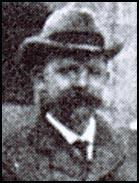 Joseph Walmsley played football for Blackburn Olympic. Later he
became a local cotton mill manager.
Joseph Walmsley played football for Blackburn Olympic. Later he
became a local cotton mill manager.
Blackburn Rovers had experienced a great deal of success under
Tom Mitchell, Blackburn's club secretary/manager. However, in
October, 1896, Mitchell resigned. Joseph Walmsley was appointed
to replace Mitchell. It seemed Blackburn missed Mitchell as they
slumped to 14th place in the First Division of the Football
League in the 1896-97 season.
In the 1897-98 season Blackburn Rovers finished second from
bottom. Only a decision to increase the size of the First
Division of the Football League to 18 clubs saved Blackburn from
relegation. The following season saw a revival with the team
finishing in a respectable 6th place.
Blackburn found itself in another relegation struggle in the
1899-1900 season. The club had to win one of its last two games
against Notts County and Preston North End in order to avoid the
drop to the Second Division. Blackburn lost to Preston but
managed to beat Notts County 2-0.
The Blackburn Times criticized the performance of the Blackburn
team arguing: "There can be no such thing as standing still in
the football world as in many other things, and as the Rovers
have not made headway they must have been going backwards. Alas,
this is only too plain. The rovers of today are not the Rovers
of yore, when their fame spread far and wide".
The following season, two of Blackburn's most experienced
players, George Anderson and Tom Brandon, left the club. Tom
Booth, an English international, was sold to Everton and Tommy
Briercliffe moved to Stalybridge Celtic. Considering the loss of
these good players, Blackburn did well to finish in 9th place.
Blackburn also won the Lancashire Cup beating Burnley 4-0 in the
final.
The 1901-02 season saw a major improvement in the form of
Blackburn Rovers. For a while it looked like they would win the
First Division title. However, Sunderland beat them 1-0 at Ewood
Park and this started a poor run that left them in fourth place
by the end of the season. Three of Blackburn's young stars, Fred
Blackburn, Kelly Houlker and Bob Crompton, won international
caps playing for England that season.
The ambition of the club was questioned when one of the team's
English internationals, Kelly Houlker, was allowed to sign for
Portsmouth in the Southern League. He was replaced by Lionel
Watson, who had been purchased from Manchester City.
Bob Crompton had emerged as a superb talent. Despite only being
21 years old, he had become a commanding figure in the Blackburn
defense and his leadership qualities resulted in him being
appointed club captain. In 1902 Crompton won his first
international cap for England. Playing at right-back he held his
place in the team for the next 12 years. At the age of 24 he was
appointed as England's captain.
Blackburn struggled again in the 1902-03 season. Joseph Walmsley,
Blackburn's manager, desperately needed someone to score goals
and in March, 1903, persuaded Adam Bowman from Everton to join
the club.
With only a couple of games to play, Bolton Wanderers were
already relegated. Blackburn Rovers and Grimsby Town were the
main rivals for the second club to move into the Second
Division.
On Easter Monday, Blackburn Rovers had to visit Bowman's former
club. Blackburn surprisingly beat Everton 3-0 with Adam Bowman
scoring two of the goals. Four days later, Bowman scored another
two goals in a 3-1 victory over Newcastle United. These two
results meant that Grimsby Town, rather than Blackburn was
relegated from the First Division of the Football League.
Rumors began to circulate that Blackburn Rovers had bribed
Everton players to lose the game. Officials at Grimsby lodged an
official protest and the Football Association decided to hold an
inquiry into the game. A report by the FA claimed that there was
evidence that Joseph Walmsley had tried to arrange a win for
Blackburn Rovers. However, they believed that Everton players
had not taking any bribes and that the final league placing
should remain unaltered. Walmsley was immediately banned from
having any further involvement with football.
In November 1903 Joseph Walmsley took over the license of the
Florence Hotel in Blackburn.
|
|
|


